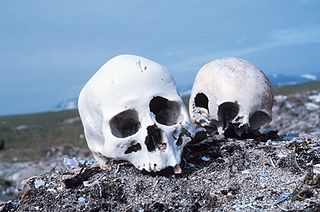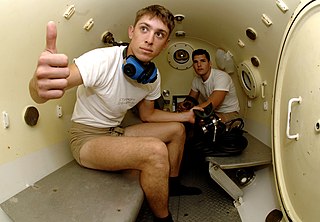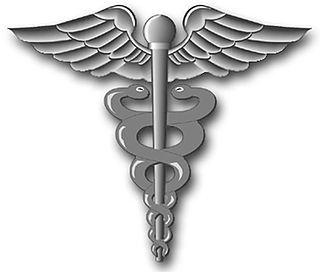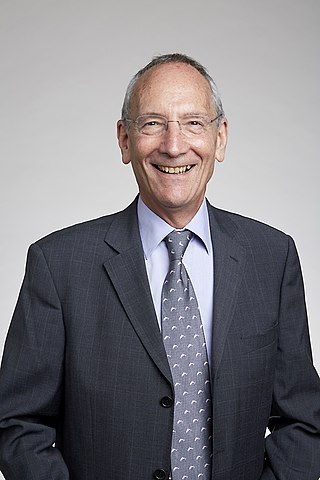
Forensic pathology is pathology that focuses on determining the cause of death by examining a corpse. A post mortem examination is performed by a medical examiner or forensic pathologist, usually during the investigation of criminal law cases and civil law cases in some jurisdictions. Coroners and medical examiners are also frequently asked to confirm the identity of remains.

Pharmacy is the science and practice of discovering, producing, preparing, dispensing, reviewing and monitoring medications, aiming to ensure the safe, effective, and affordable use of medicines. It is a miscellaneous science as it links health sciences with pharmaceutical sciences and natural sciences. The professional practice is becoming more clinically oriented as most of the drugs are now manufactured by pharmaceutical industries. Based on the setting, pharmacy practice is either classified as community or institutional pharmacy. Providing direct patient care in the community of institutional pharmacies is considered clinical pharmacy.
A fellow is a concept whose exact meaning depends on context. In learned or professional societies, it refers to a privileged member who is specially elected in recognition of their work and achievements. Within the context of higher educational institutions, a fellow can be a member of a highly ranked group of teachers at a particular college or university or a member of the governing body in some universities; it can also be a specially selected postgraduate student who has been appointed to a post granting a stipend, research facilities and other privileges for a fixed period in order to undertake some advanced study or research, often in return for teaching services. In the context of research and development-intensive large companies or corporations, the title "fellow" is sometimes given to a small number of senior scientists and engineers. In the context of medical education in North America, a fellow is a physician who is undergoing a supervised, sub-specialty medical training (fellowship) after having completed a specialty training program (residency).
A Bachelor of Medicine, Bachelor of Surgery is an undergraduate degree awarded by medical schools in the United Kingdom, Commonwealth of Nations and other countries. The historical degree nomenclature states that they are two separate undergraduate degrees. In practice, however, they are usually combined as one degree course and conferred together, and may also be awarded at graduate-level medical schools. It usually takes five to six years to complete this course.

Residency or postgraduate training is a stage of graduate medical education. It refers to a qualified physician, veterinarian, dentist, podiatrist (DPM) or pharmacist (PharmD) who practices medicine, veterinary medicine, dentistry, podiatry, or clinical pharmacy, respectively, usually in a hospital or clinic, under the direct or indirect supervision of a senior medical clinician registered in that specialty such as an attending physician or consultant. In many jurisdictions, successful completion of such training is a requirement in order to obtain an unrestricted license to practice medicine, and in particular a license to practice a chosen specialty. In the meantime they practice "on" the license of their supervising physician. An individual engaged in such training may be referred to as a resident, registrar or trainee depending on the jurisdiction. Residency training may be followed by fellowship or sub-specialty training.

Diving medicine, also called undersea and hyperbaric medicine (UHB), is the diagnosis, treatment and prevention of conditions caused by humans entering the undersea environment. It includes the effects on the body of pressure on gases, the diagnosis and treatment of conditions caused by marine hazards and how relationships of a diver's fitness to dive affect a diver's safety. Diving medical practitioners are also expected to be competent in the examination of divers and potential divers to determine fitness to dive.

A hospital corpsman is an enlisted medical specialist of the United States Navy, who may also serve in a U.S. Marine Corps unit. The corresponding rating within the United States Coast Guard is health services technician (HS).
A senior house officer (SHO) is a non-consultant hospital doctor in the Republic of Ireland. SHOs are supervised in their work by consultants and registrars. In training posts these registrars and consultants oversee training and are usually their designated clinical supervisors.
In the United Kingdom, Ireland, and parts of the Commonwealth, consultant is the title of a senior hospital-based physician or surgeon who has completed all of their specialist training and been placed on the specialist register in their chosen speciality. Their role is entirely distinct from that of general practitioners, or GPs.

Stafford Louis Lightman has been Professor of Medicine, University of Bristol, since 1993. He was president of the British Neuroscience Association 2017–2019.

In modern medicine, a surgeon is a medical doctor who performs surgery. Although there are different traditions in different times and places, a modern surgeon is also a licensed physician or received the same medical training as physicians before specializing in surgery. There are also surgeons in podiatry, dentistry, and veterinary medicine. It is estimated that surgeons perform over 300 million surgical procedures globally each year.
Robin Skynner was a psychiatric pioneer and innovator in treating mental illness.
A clinical officer (CO) is a gazetted officer who is qualified and licensed to practice medicine.

Mercer's Hospital was a hospital in Dublin, Ireland. It was converted into a clinical centre and medical library for the Royal College of Surgeons in Ireland in 1991.
John A. Galloway is an endocrinologist who has made major contributions to the study and treatment of diabetes. He was clinical research fellow and principal physician in charge of diabetes-related research at the Lilly Laboratory for Clinical Research. The holder of four patents and author of over 80 publications, Galloway also served as Professor of Medicine at the Indiana University School of Medicine.
Gurumukh Sajanmal Sainani is an Indian general physician, medical researcher, medical writer and an Emeritus Professor of the National Academy of Medical Sciences. He is a former director of the All India Heart Foundation and the incumbent director of Jaslok Hospital, Mumbai. He is a recipient of the highest Indian award in the medical category, Dr. B. C. Roy Award, from the Medical Council of India and the rank of Honorary Brigadier from the President of India. The Government of India awarded him the fourth highest civilian award of the Padma Shri in 2000.
Jagdev Singh Guleria is an Indian general physician, cardiologist and a former Dean and Professor of the All India Institute of Medical Sciences, New Delhi. He is the senior consultant of General Medicine at Sitaram Bhartia Institute of Science and Research and an Emeritus Professor of the National Academy of Medical Sciences. He received the fourth highest Indian civilian honour of the Padma Shri in 2003.
Professor Geoffrey Warren Hanks DSc(Med), (1946-2013), also known as Geoff, was a British palliative care specialist.
Professor Sir Michael Oliver McBride is a consultant physician who has served as the Chief Medical Officer for Northern Ireland since September 2006.

A teaching hospital is a hospital or medical centre that provides medical education and training to future and current health professionals. Teaching hospitals are almost always affiliated with one or more universities and are often co-located with medical schools.








